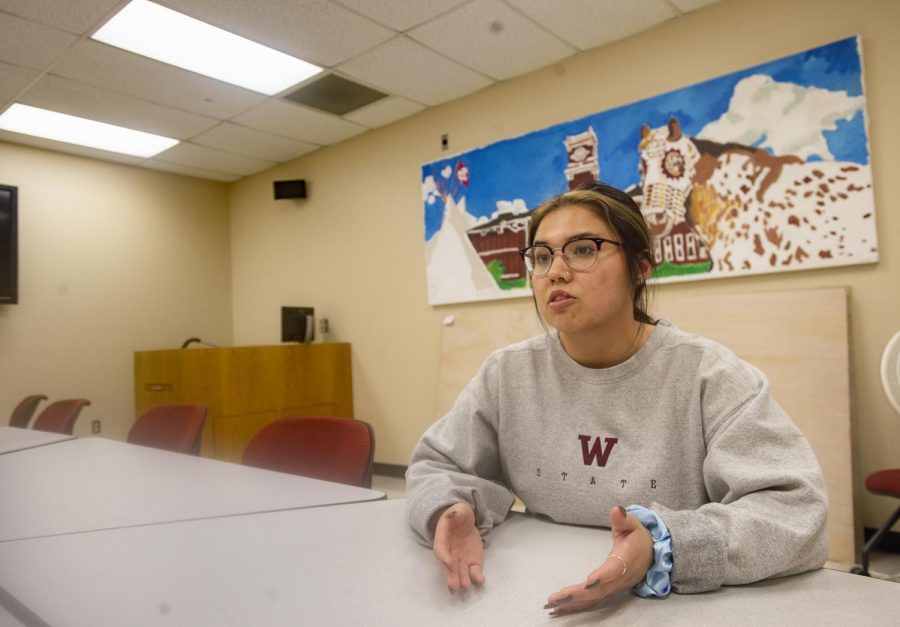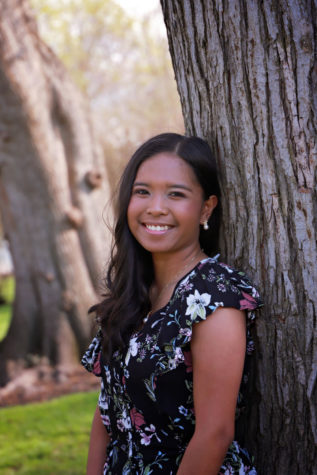Students celebrate Native Americans’ resiliency
Thanksgiving dinner provided opportunity for community to de-stress, reflect on blessings
Kaitlin Srader, junior sociology and women’s studies double major, says the event supports marginalized students on Wednesday in the Native American Student Center.
November 21, 2019
The WSU Native American Programs hosted a community Thanksgiving dinner Wednesday evening in Cleveland Hall as part of Native American Heritage Month.
Joelle Berg, Native American retention specialist and event organizer, said the community dinner was a way for students and staff to socialize, de-stress and be thankful. The Native American Programs used to have community dinners every month, but they downsized those to organize a bigger Thanksgiving celebration this year.
Zoe Higheagle Strong, executive director for Tribal Relations, said the event is important because it brings people together and encourages students to finish the semester strong.
“It makes me want to advocate for even more resources and do what I can for WSU to be a better environment that really celebrates the excellence of our students,” she said.
Kaitlin Srader, junior sociology and women’s studies double major, said the community Thanksgiving dinner was a lighthearted event. It provided an opportunity for students from marginalized communities to take some time away from their worries and reflect on all the blessings they have.
“You’re so focused on succeeding and being afraid of failure that if you don’t get these XYZ things done, it just burdens yourself even more,” she said. “When you’re able to separate yourself from that, I think that really helps on how you feel about yourself and success.”
For Srader, Thanksgiving does not represent the traditional view of Native American Indians and Pilgrims coming together. She said she is reminded of the experiences her ancestors have faced, including current issues like the plight of murdered indigenous women.
“I think Thanksgiving to me as an indigenous woman is a celebration for the resilience that our ancestors and our tribal people have overcome,” Srader said. “It’s just to show all of the progress we’ve done, especially existing in an institution that was not intended for our existence.”
Srader said the university has taken steps to support indigenous people on campus. She and other student leaders helped petition for the declaration of acknowledging Indigenous Peoples’ Day, which was signed by WSU President Kirk Schulz last year. However, she said more education needs to be done to support indigenous people on campus.
“Progress takes time,” Srader said.
There are negative connotations associated with Native Americans during Thanksgiving, Berg said. However, community dinners help spread awareness about the negative stereotypes people may have about Native Americans.
Thanksgiving is traditionally used to stereotype Native American individuals, Higheagle Strong said. Some people might see Native Americans as a group of people who need rescuing, but Higheagle Strong disagrees with this view.
She said Native Americans experience many barriers and adversities regularly throughout the year, but they continue to persevere and overcome life’s challenges.
“I think our history and where we’re at today represents that strong resiliency,” Higheagle Strong said. “Sometimes people don’t appreciate when they see a student in class, how much they’ve persevered to be there.”
Higheagle Strong said it is crucial for people to learn about the history of indigenous communities by building relationships with indigneous people. People can do this by asking questions and taking the time to listen to what indigenous people have experienced.
“I encourage folks to take time to learn,” she said. “These months are meant to be reflective, too, and it’s an opportunity to learn in an intellectual university.”










